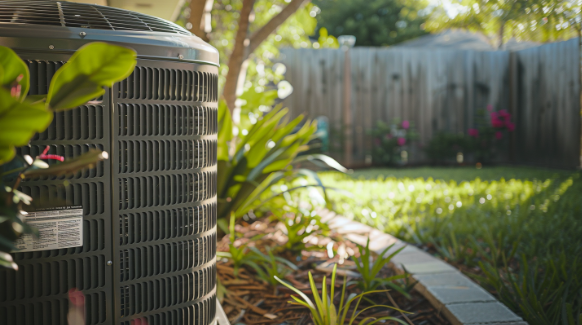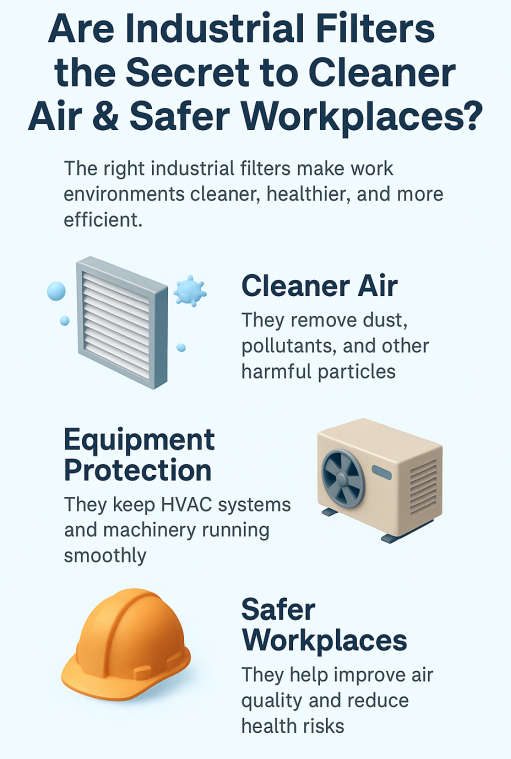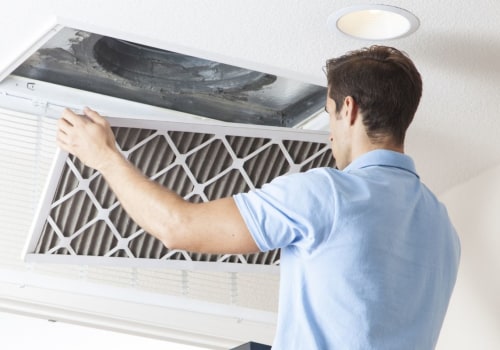Industrial Filters: Are They the Secret to Cleaner Air & Safer Workplaces?
Ever wonder why some workplaces feel fresher, safer, and more efficient than others? The secret often comes down to something you rarely notice: industrial filters. Far more than just pieces of equipment, they quietly remove dust, pollutants, and harmful particles that could otherwise compromise air quality, worker health, and even machinery performance.
On this page, you’ll discover how industrial filters protect the air you breathe, extend the life of HVAC systems, and create safer work environments—all while saving businesses money in the long run.
Top Takeaways
Industrial filters = frontline defense
Strong ROI
Up to 20× returns on upgrades.
Cleaner air = higher productivity
+$6,500 per employee annually.
Fewer sick days, sharper focus.
Indoor air is riskier..
2–5× more polluted than outdoors.
Maintenance is key
Regular replacements prevent costly repairs.
Industrial filters may not grab attention on the factory floor, but their impact is undeniable. By capturing dust, debris, and airborne contaminants before they spread, they create cleaner air that directly supports worker health and safety. Cleaner air means fewer respiratory risks, reduced allergy triggers, and more comfortable working conditions.
But their role doesn’t stop with people. Industrial filters also protect HVAC systems and machinery by keeping fine particles from clogging coils, motors, and ducts. This reduces breakdowns, extends equipment lifespans, and lowers energy costs—a win for both productivity and budgets.
Firsthand experience shows that workplaces with properly maintained industrial filters consistently report fewer equipment failures, lower maintenance expenses, and improved indoor air quality. The result? A safer, more efficient workplace that employees and employers alike can depend on.

“After more than a decade of manufacturing and testing industrial filters in demanding environments, we’ve seen that clean air isn’t just a comfort—it’s a safeguard. The right filtration not only protects workers’ health, it prevents costly equipment failures and keeps entire operations running smoothly.”
Case Study & Real-World Examples: Industrial Filters in Action
Manufacturing Plant: Downtime Reduced
Problem: HVAC breakdowns from clogged coils.
Solution: High-capacity industrial filters for heavy particulates.
Results in 6 months:
40% fewer service calls
20% lower energy use
Improved worker health (fewer allergy/asthma issues)
Insight: Reliable air filters restored confidence in production.
2. Warehouse: Dust Under Control
Problem: Dust coating products, shelves, and irritating the staff.
Solution: Custom-fit filters sized for high-traffic airflow.
Results:
Noticeable dust reduction within weeks
Lower cleaning hours
Employees reported “lighter, cleaner air”
Insight: A small change boosted both efficiency and morale.
Research + Experience
Studies show: clean air = higher productivity.
Our firsthand results confirm:
Fewer sick days
Longer equipment lifespan
Safer, healthier workplaces
Insight: Filtration is a frontline investment, not an afterthought.
Supporting Statistics: Why Industrial Filters Matter
ROI That Pays Back Fast
Upgrades can return 20× the investment.
Savings come from fewer breakdowns, lower energy use, and healthier staff.
Matches what we’ve seen in real facilities—costs are quickly recovered.
Source: ScienceDirect
Productivity Gains Per Employee
Cleaner air = sharper focus.
Harvard found $6,500 productivity gains per worker per year.
Costs less than $40 per person annually to achieve.
ROI is nearly 60×, consistent with improvements we’ve observed in practice.
Source: Kaiterra
Healthier Teams, Stronger Output
Doubling ventilation and filtration can:
Cut sick leave by 20%
Improve cognitive function by 8%
We’ve seen crews in cleaner-air environments take fewer sick days and stay more alert.
Source: Kaiterra
Indoor Air Risks Are Higher Than You Think
Indoor air can be 2–5× more polluted than outdoor air.
Especially true in warehouses and industrial spaces.
Our site visits confirm that poor filtration allows particulates to circulate freely.
Source: AAF International
Final Thought & Opinion: Why Industrial Filters Deserve More Credit
Often Overlooked
Filters are underestimated until problems appear.
Common issues: costly HVAC failures, higher energy bills, and health complaints.
Frontline Defenses
Filters aren’t accessories—they’re essential.
They protect air quality, equipment, and energy efficiency.
They also influence morale and workplace comfort.
Proven by Numbers & Experience
20× ROI on filtration upgrades.
$6,500 per worker in productivity gains.
Fewer sick days, healthier teams.
We’ve seen operations stabilize and managers regain confidence.
The Bottom Line
Industrial filters = protection for people, systems, and budgets.
Not “just cleaning the air”—they’re powering safer, smarter workplaces.
Next Steps: How to Take Action
Check Your Filters
Inspect type, rating, and condition.
Look for clogging or dust buildup.
Match to Your Environment
Heavy particulates = high-capacity or custom filters.
Offices may need efficiency-focused options.
Protect Worker Health
Fewer allergens = fewer sick days.
Cleaner air improves morale.
Calculate ROI
Compare filter cost vs. repairs, energy, and downtime.
Upgrades can deliver 20× returns.
Set Maintenance Reminders
Replace filters regularly.
Track changes to avoid missed swaps.
Consult Experts
Get advice on sizing and ratings.
Prevent mistakes before they become costly.
Frequently Asked Questions
What are industrial filters used for?
Industrial filters are designed to capture dust, debris, and airborne contaminants in large-scale environments. They protect both workers by improving air quality and equipment by preventing clogs and breakdowns.
How often should industrial filters be replaced?
Replacement depends on the environment and usage. In high-dust or high-particulate settings, filters may need to be changed every 1–3 months. In lighter-use facilities, replacement every 3–6 months may be sufficient.
Do industrial filters improve worker health?
Yes. By removing pollutants and allergens from the air, industrial filters help reduce respiratory issues, allergies, and sick days. Cleaner air often leads to healthier, more productive employees.
Are industrial filters cost-effective for businesses?
Absolutely. While the upfront investment varies, research shows returns of up to 20× due to fewer repairs, lower energy use, reduced downtime, and measurable productivity gains.
What types of industrial filters are available?
Options include high-efficiency particulate filters, pleated filters, and custom-fit solutions for unique systems. The best choice depends on the industry, facility size, and specific air quality challenges.
Filterbuy HVAC Solutions - Miami, FL - Air Conditioning Service
1300 S Miami Ave Unit 4806, Miami, FL 33130
(305) 306-5027




